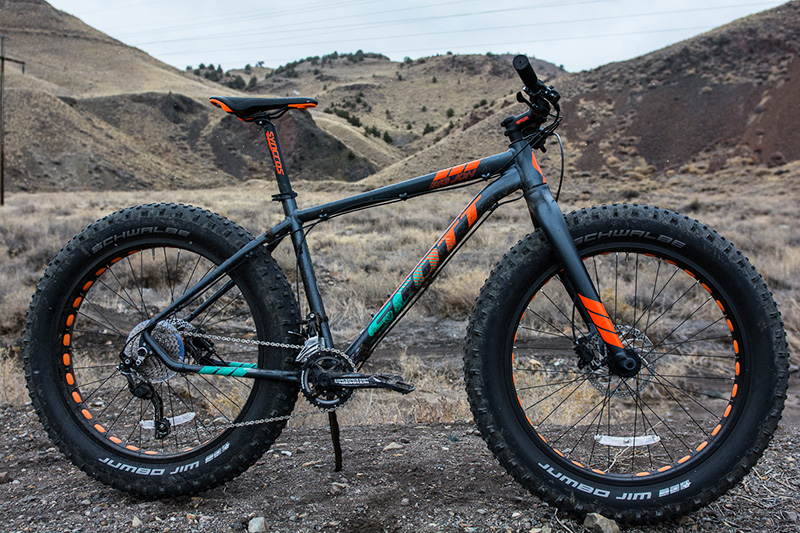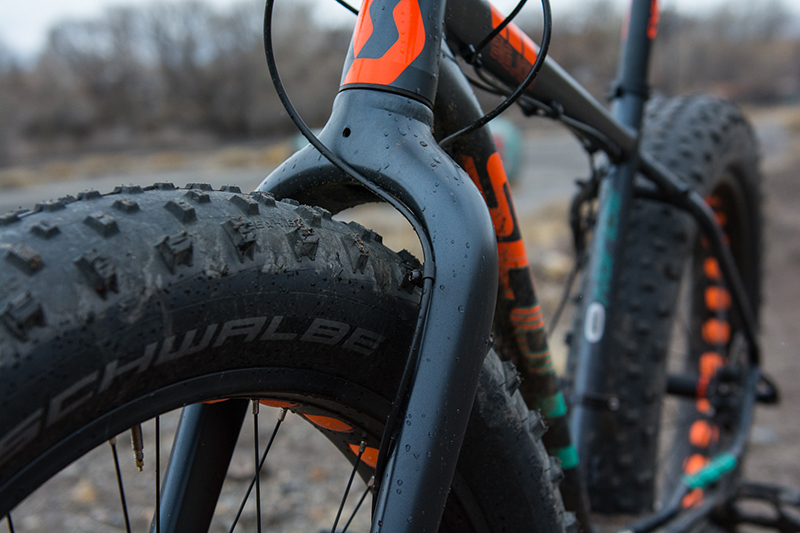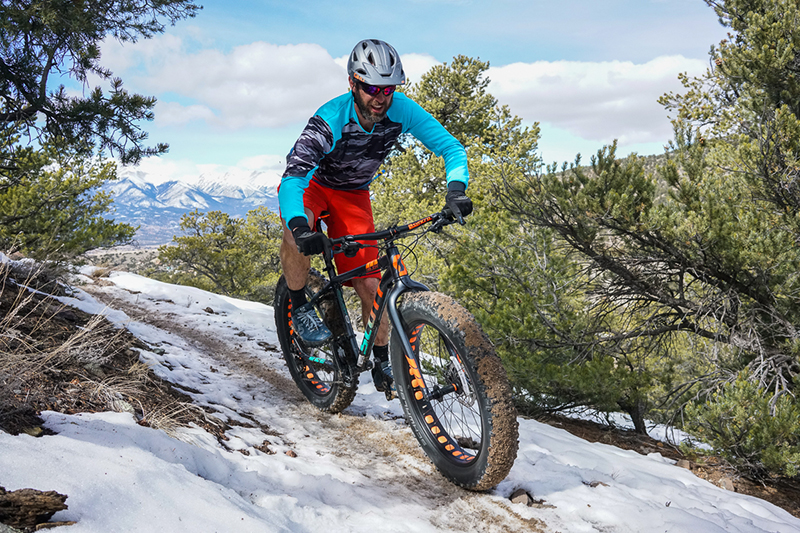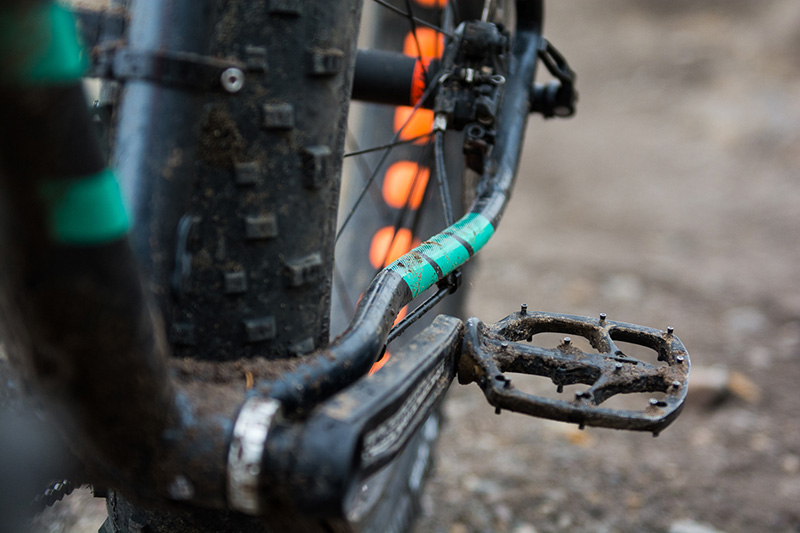Review: Scott Big Jon Fat Bike
Originally posted on February 15, 2017 at 1:15 amWords and photos by Zach White
It seemed fitting to have a budget-oriented fat bike show up at the doorstep the day after getting back from riding a handful of various all-carbon, high-end fat bikes in Crested Butte during Fat Bike World Championships. Pedaling $5000+ fat bikes around in big, mellow, snowy loops at a standardly sluggish pace had me wondering just how much of a difference could be felt between minor or even somewhat major variations in frame designs and materials, given the vagueness in feel that both soft, oversized tires and soft, snowy trail provide. It’s not to say that all fat bikes perform the same by any means. It’s just that the slower, deflated arena in which they perform in doesn’t exactly lend itself to deciphering as big of differences as found in trail bikes.

At $1600 complete, the Scott Big Jon is essentially the same price as what many of the high-end frame-only options are going for. Sure, its 6061 butted aluminum tubing isn’t going to be as light as that of a carbon frame, and its build kit is more of the essentials variety that doesn’t do it any fat-fighting favors either, but when it comes time to bundle up and slog around at low speeds in lower temps on ridiculously low-pressure tires, I was hard pressed to find any low points with the Scott in direct comparison to bikes it shouldn’t be compared to. At 34.6lbs(with pedals and wheel reflectors), common bike-geek sense will tell you it’d climb better if it weighed less, probably handle a little livelier when it comes time to throw it around, and might have a more forgiving ride from carbon materials. And, if money weren’t an object, a lighter bike with the same geometry would be chosen over the Big Jon any day. But, at roughly 1/3 the price of something light and fancy, especially for what many riders consider a seasonal addition to their quiver, the Big Jon is one of the very few budget-oriented bikes I’ve been almost as impressed with as I have been with other high-end options.
The fully rigid Big Jon comes stock with 26×4.8” Schwalbe Jumbo Jim tires mounted on 80mm wide Syncros rims, and Scott states those are the biggest tires the chassis will allow. For those who may have a favorite tire in a 5-inch flavor, it appears that there may be enough clearance for that much more rubber. However, if snow or muck is sticking to the knobs, clearance may be an issue. 32-hole Syncros hubs and 15-gauge spoked round out the wheelset, and are held on via 150×15 and 197×12 QR thru-axles, front to back.

Geometry on the fully rigid Big Jon lends itself to easy handling on snowy trail, with a predictable and stiff front end angled out to 69-degrees, and a surprisingly unrestrictive feel from the not-exactly-short 18.3-inch chainstays, allowing for easier wheelies and general front-end maneuverability than expected. A 73-degree seat tube and a roomy top tube made for a comfortable cockpit that lined up rider weight in a balanced location.
Some minor tweaks to the frame from previous year models have been said to improve ankle and leg clearance around the seat stays, which seems to have paid off as there weren’t any rubbing issues – something that I often do have problems with on bikes that aren’t sorted in this arena.
Trail time on the Big Jon consisted of slogging along on snowy or snow and dirt mixed trail, usually at lower speeds with air pressure in the 6-8psi range. In other words, it was ridden in conditions typical of what fat bikes are designed for. In these parameters, so much of the ride is reliant on tire pressure and width that it’s hard to have a chassis truly stand out, short of major flaws in otherwise straightforward geometry. The Big Jon was no exception, and provided perfectly average angles and proportional sizing for dinking around on snowy trails. On the few little dry sections of rocky, rooty singletrack between snowpack, it behaved like a fat bike would be expected to.

Scott opted for a Shimano Deore 2x drivetrain on the Big Jon, which is nice for rides that require a bit of steeper climbing, but otherwise it just makes a little more sense to omit the extra moving parts and their accompanying weight, especially for a bike that’s meant to be ridden in flatter, sloppy conditions. Considering traction is usually lost on anything steeper than a mellow roller when pedaling on snow before riders run out of gearing, the 2x system is the one spec that seemed a little off. Otherwise, the Deore shifting itself was flawless, as were the accompanying Deore brakes(180mm rotor in the front, 160mm in the back).



The rest of the build kit works nicely and is a well sorted, alloy mix of mostly Syncros staples. If someone were to buy this bike and suddenly become weight-conscious, it wouldn’t be hard to drop a pound or three with a few key carbon options, if not toss the front derailleur and all that entails, too. Being as how the Big Jon is only a couple of pounds shy of something like a steel REEB Reebdonkadonk which has a frame-only retail price of $1600, spending a few hundred dollars on carbon bars, post, etc, and Scott’s entry level fat bike is still a strong fiscal argument.
Overall, Scott’s Big Jon is an excellent option for a snow bike, regardless of pricing. It has a comfortable cockpit, offers a predictable ride, and the latest rendition has buffed out minor flaws of previous generation. Factor in the price, and that it’s a pretty decent looking bike to boot, and the Big Jon seems like a no-brainer for riders who’s intention of owning a fat bike is to putz around in the snow a few times a week through the winter.
MSRP $1599
Sizes S, M, L (tested), XL